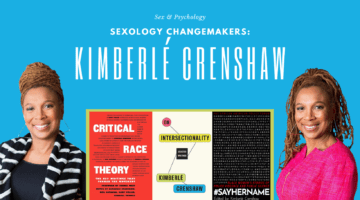Who Has a Higher Sex Drive: Women or Men?
August 30, 2017 by Justin Lehmiller
My social media feed has been blowing up lately with links to article headlines like this one from HuffPost, “Women Want More Sex Than Their Partner Does, According To New Study.” Naturally, as a sex researcher, I was intrigued–I wanted to read the paper and learn more. However, I was disappointed to learn that this wasn’t actually a scientific study and that numerous media outlets were reporting on it like it was legit science. Let’s take a closer look at this “study” and what it does and doesn’t tell us.
It appears that some website called Voucher Codes Pro conducted a survey of 2,383 British adults in long-term relationships in which people were asked some questions about their sex lives. So, this wasn’t research conducted by scientists that was published in an academic journal—it was a survey carried out by a private company I’ve never heard of that I suspect probably just wanted to garner some free press attention by releasing the results of a sex survey (at least that’s what the cynic in me says).
Private companies do these kinds of surveys all of the time, and their results can potentially be informative, but you can only determine that by evaluating their methodology. Unfortunately, virtually no details on their methodology are available. I searched extensively online and all I can find is a series of media articles that link back to one another (kind of like a game of “telephone”). Most seem to point to an article in Metro as the source (oddly, though, no details are available on the Voucher Codes Pro site itself). The Metro article tells us only how many people were surveyed and summarizes the findings. However, that’s not nearly good enough for me to evaluate whether this is a good quality survey.
For one thing, we don’t know what specific questions were asked or what the response options were. That’s a big deal. We don’t know whether they were using valid and reliable questions drawn from previous research, or if they simply made up some questions themselves. As someone who regularly teaches a course called Social Psychology of Attitudes in which I devote half of a semester to best practices in survey writing, I can attest that most people are pretty bad when it comes to writing survey questions—you really need scientific training in order to know how to do this (e.g., to avoid things like leading and loaded questions, to understand how the order and wording of your questions can influence the responses you receive, etc.).
For another, we don’t know how the participants were recruited. Where did they come from? Social media? A market research panel? Somewhere else? Also, how was the survey advertised and what kind of selection effects did that create? For example, was it advertised as a survey of couples experiencing sex and relationship problems? Moreover besides being British adults in LTRs, what were the other characteristics of the sample, like sexual orientation, race, and socioeconomic status? This information is important for understanding whether certain groups are over- or under-represented. Finally were there differences in age or other demographic characteristics between the male and female sub-samples that could potentially be contributing to the results they found?
Had this “study” been submitted to an academic journal, it would have undergone peer review in which questions like this would have been asked. However, because it wasn’t, I have no way of evaluating these data and, consequently, I am extremely hesitant to draw sweeping conclusions from them (as many media outlets have), especially when you consider that the main finding (that women desire more sex than men by a wide margin) runs contrary to most published scientific research on gender and sex drive.
“Saying that men’s sex drive is higher on average is not the same as saying that women have a low sex drive or don’t want sex.”
For example, consider a 2009 article published in the Archives of Sexual Behavior that involved a sample of over 200,000 adults from 53 nations [1]. That study concluded that men have higher sex drives on average than women and that this is a large effect that is consistent across cultures. Interestingly, however, this study also found that there’s more variability in women’s sex drive compared to men. This tells us that there are indeed going to be a lot of women who have sex drives that are higher than a lot men. On average, though, there is a sizeable difference in sex drive such that men tend to be higher than women.
Likewise, a 2001 article published in Personality and Social Psychology Review analyzed the evidence across dozens of studies and found a consistent pattern such that male sex drive on average is higher than female sex drive [2].
To be clear, none of this research says that women have a low sex drive. Saying that men’s sex drive is higher on average is not the same as saying that women have a low sex drive or don’t want sex. Women are sexual beings and the fact that there’s a gender difference should not be taken to mean that women are uninterested in sex or that their sexual needs and wants are any less important.
Let me also clarify that average differences between groups don’t tell us about specific individuals. There’s a lot of variability in sex drive–and, according to the research, there’s even more variability among women than there is among men. As such, it’s important to avoid making assumptions about specific individuals’ sex drives based on group averages.
With all of that said, I’m disappointed—but not surprised—that so many media outlets have given people a mistaken impression about this “study” and accorded it the same level of credibility as scientific research. The findings revealed in this survey are certainly intriguing and I understand why they’ve captured so much attention; however, I hope you now see why it’s advisable to avoid reading too much into them–especially until we know more about the methods.
Want to learn more about Sex and Psychology ? Click here for previous articles or follow the blog on Facebook (facebook.com/psychologyofsex), Twitter (@JustinLehmiller), or Reddit (reddit.com/r/psychologyofsex) to receive updates.
[1] Lippa, R. A. (2009). Sex differences in sex drive, sociosexuality, and height across 53 nations: Testing evolutionary and social structural theories. Archives of Sexual Behavior, 38(5), 631-651.
[2] Baumeister, R. F., Catanese, K. R., & Vohs, K. D. (2001). Is there a gender difference in strength of sex drive? Theoretical views, conceptual distinctions, and a review of relevant evidence. Personality and Social Psychology Review, 5(3), 242-273.
Image Source: 123RF/anyaberkut
You Might Also Like:

Dr. Justin Lehmiller
Founder & Owner of Sex and PsychologyDr. Justin Lehmiller is a social psychologist and Research Fellow at The Kinsey Institute. He runs the Sex and Psychology blog and podcast and is author of the popular book Tell Me What You Want. Dr. Lehmiller is an award-winning educator, and a prolific researcher who has published more than 50 academic works.
Read full bio >


